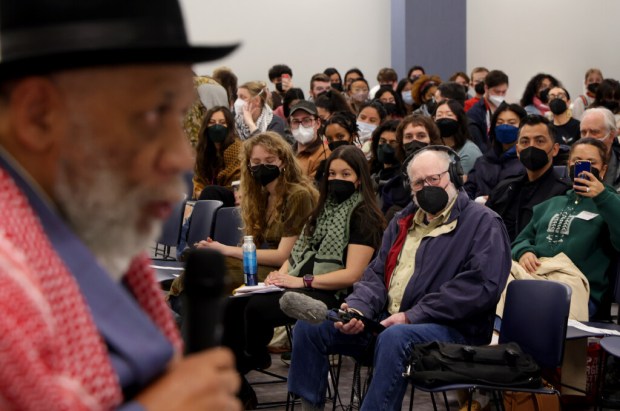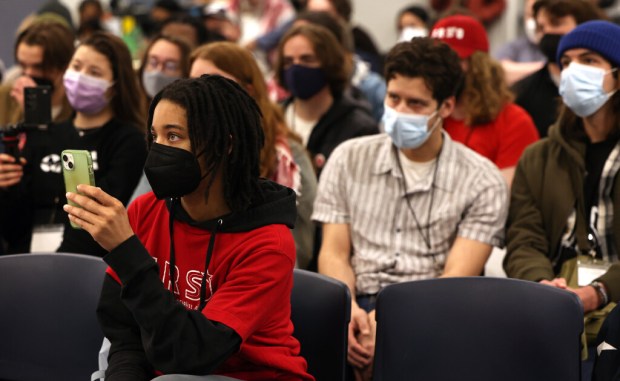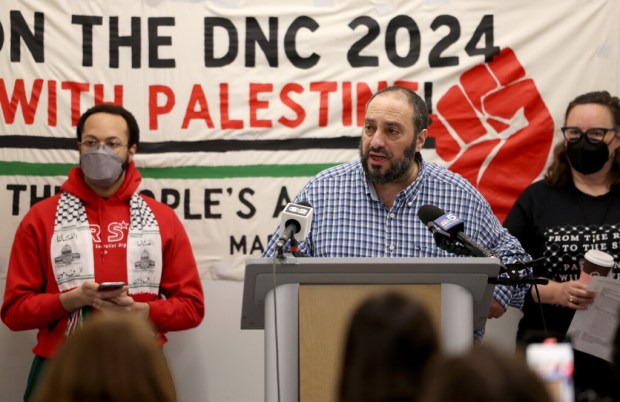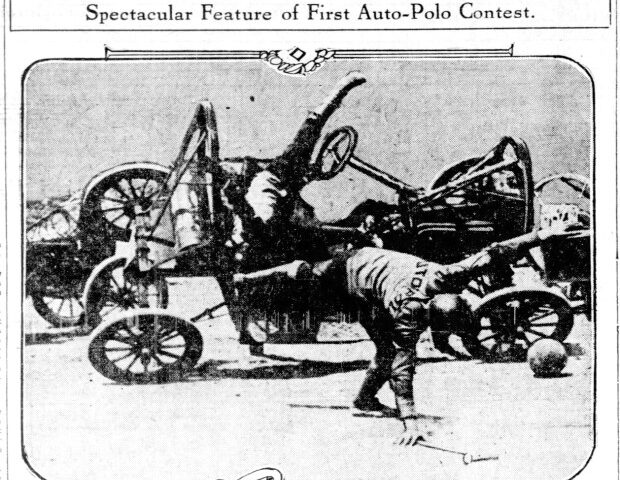Progressive activist groups from across the country are preparing to protest outside the Democratic National Convention “with or without permits” come August.
Coalition leaders have attested their right to be within “sight and sound” of the convention’s center stage at the United Center, citing First Amendment rights in a federal lawsuit filed last month. On Saturday, leaders reaffirmed their commitment to be heard outside the DNC, despite the city’s denial of protest permits closer to the convention’s site.
A couple of hundred people representing 78 activist organizations gathered Saturday for a day-long “working conference” hosted by the March on the DNC coalition to organize fundraising, communications and logistics for the months ahead before top Democratic politicians arrive in Chicago. While support for a ceasefire in Palestine is the unifying cause, the coalition includes representatives from dozens of causes, including reproductive rights, labor rights, and immigrant and undocumented persons rights.
“We’ll be marching with or without permits. This DNC is the most important one since 1968, also in Chicago when Vietnam War protesters and the black liberation movement organized mass demonstrations that were violently repressed,” said Hatem Abudayyeh, executive director of the U.S. Palestinian Community Network, at a coalition conference Saturday on the Near West Side to organize protest efforts. “The march on the DNC will be the largest mobilization for Palestine in the history of the city.”
Hatem Abudayyeh, national chair of the United States Palestinian Community Network, speaks to a crowd of several hundred people during a meeting of the Coalition to March on the Democratic National Convention (DNC) on Saturday, April 13, 2024, in Chicago. Activists and organizers came together to plan their efforts of opposition to the Democratic National Convention taking place this August in Chicago. (Stacey Wescott/Chicago Tribune)
The city has repeatedly argued in court that Chicago does not have enough police to protect the parade, keep protesters in check and regulate traffic, records show. As the Chicago Department of Transportation denied each protest permit, it offered each applicant the same alternate route: a 2-block march up a tree-lined stretch of Columbus Drive in the middle of Grant Park from Roosevelt Road to Jackson Drive — which demonstrators have rejected, as the site is nearly four miles away from the convention’s headquarters.
Organizers have planned two alternative protests on the Near West Side, one at Union Park on Aug. 19 and another near Addams Park on Aug. 22.
With pressure between activists and the city mounting, organizers are encouraging supporters to show up in large numbers in August to make crowds harder to disperse.
“If the people in this room want to make sure that we get as close as possible to Biden, what we need to do is bring as many people as possible because then it’s gonna be hard to keep us from being able to get close to them,” said Meredith Aby, a lead organizer with the Minnesota Anti-War Committee, addressing a packed room of coalition members.
Even with the scheduled alternative protests, organizers say they are confident in winning the federal lawsuit and still set on obtaining city permits through increased pressure on Mayor Brandon Johnson, who last month affirmed his commitment to allow free speech demonstrations.

“We know that he’s a community organizer and he came from the movement,” Abudayyeh said of Johnson. “So we’re asking him and his administration directly to intercede here and to make sure that we get the permits to march within sight and sound of the United Center.”
“And because he’s a community organizer, he knows that he can also be a target of ours. A respectful target of ours, but we will ask him and we will continue to ask him and we will continue to press him and his office to make sure that they facilitate these marches and protests as well,” he added.
Organizers passed around a petition addressed to CDOT that called on attendees to leave voicemails at the mayor’s office.
Abudayyeh, a lead organizer behind the more than 20 mass pro-Palestinian movements since October, said the coalition could see numbers up into the hundreds of thousands, as they await word of more groups who will join. For instance, one group in the coalition, Chicago Alliance Against Racist and Political Repression, has upwards of 30,000 members alone.

A sneak peek of the coalition’s organizing efforts could come in July, when the Republican National Committee sets up shop for its national convention in Milwaukee, just 90 miles north of Chicago.
“It’s right down the block…I’m sure the majority of the organizations that are here, definitely, the leadership of our coalition is going to be mobilizing for that as well,” Abudayyeh said. ” But I can’t imagine that the RNC mobilization is going to be even close to the DNC.”
With the city set to receive $75 million in federal funding for DNC security, federal authorities are planning a security perimeter around the United Center while top Chicago police officials responsible for security say planning and training are long underway. The training will focus on “constitutional policing,” police said.
On Friday, a coalition of the community groups that triggered the ongoing federal consent decree over Chicago’s policing practices asked the judge overseeing the agreement to block the police department from implementing a new mass arrest policy drafted in preparation for August’s convention.
The American Civil Liberties Union of Illinois and other free speech groups argue the new proposed policy “eviscerates protections required by the First Amendment, the Consent Decree, and CPD’s existing First Amendment policy to protect people engaged in First Amendment expression and activity.”
The groups argue that the new proposal is overly broad, fails to make proper accommodations for people with disabilities and non-English speakers, and marks a step back from a First Amendment policy that was negotiated after the “violent and unconstitutional response” to the 2020 protests over the police killing of George Floyd, according to the filing.
Among other issues, the proposed policy fails to distinguish between different types of gatherings and which ones are constitutionally protected, the filing states.
The groups have asked Judge Rebecca Pallmeyer to intervene swiftly because “CPD officers are already being trained on the infirm policy for the DNC.”
“The mass arrest policy must be brought into compliance with the Consent Decree and the First Amendment with enough time to train thousands of CPD officers and supervisors by the August DNC,” the filing states.
The groups say city officials—who did not discuss the proposed policy with the coalition before its Feb. 9 release for public comment—have not made themselves available to meet about the issue until the week of April 22. That’s six weeks after the groups initially raised issues with the policy in a March 13 letter to Pallmeyer.
The coalition is asking Pallmeyer to halt any training on the proposed policy, order the Police Department to train officers on the agreed policy, and allow the coalition to attend training sessions.
A police spokeswoman declined to comment, citing the pending litigation.
The Tribune’s Dan Petrella contributed to this report




